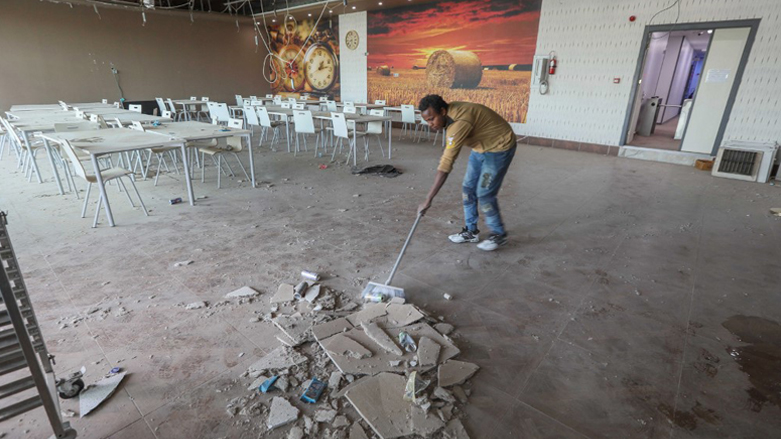US officials: Missile attack on Erbil came from Iran
It is not entirely clear what triggered Sunday’s attack, but it seems part of a broader hardening of Iran’s posture toward the US

WASHINGTON DC, United States (Kurdistan24)–“A missile strike early Sunday that landed in the vicinity of a new American consulate under construction in northern Iraq originated from Iran, according to US officials,” The Wall Street Journal reported.
The missiles fell in Erbil, capital of the Kurdistan Region, east of the new US consulate there.
“There is no damage or casualties at any US Government facility,” a State Department Spokesperson told Kurdistan 24, adding, “We condemn this outrageous attack and display of violence.”
The attack, which occurred at 1:20 AM local time, involved a dozen ballistic missiles and did cause damage to the headquarters of Kurdistan 24, however.
Background and Context of Missile Attack
The assault marked the first time since Jan. 8, 2020, that Iran has fired missiles from its own territory into Iraq. Then, the target was Iraq’s Ayn al-Asad Air Base in the west of the al-Anbar province, where US forces are based.
That attack was retaliation for the US assassination of Qasim Soleimani five days before, the head of the Qods Force of Iran’s Islamic Revolutionary Guard Corps.
It is not entirely clear what triggered Sunday’s attack, but it seems part of a broader hardening of Iran’s posture toward the US.
Notably, Tehran’s position on the revival of the 2015 Iranian nuclear accord stiffened significantly last Thursday.
At that time, Supreme Leader Ali Khamenei pronounced, ”It's a big error to bow to the pressure from America or other powers to secure protection against sanctions, which will deal a blow to the nation's political power.”
Russia has also imposed new conditions on reviving the deal, and the result has been the temporary suspension of the talks, even as the negotiators believed that they were on the verge of reaching a new agreement.
Quite possibly, Sunday’s missile strike is related to the crisis in Ukraine and the confrontation between Russia, on the one hand, and the US, Europe, and much of the rest of the world, on the other.
Russia needs all the political support it can muster. The Kurds, in both the Kurdistan Region of Iraq and in northeast Syria, are aligned with the US. Their adversaries are aligned with Russia.
Present circumstances give Russia’s allies, like Iran, enhanced leverage with Moscow. In fact, Moscow may well welcome the pressure that its allies can put on America’s allies.
In late January, while Russian forces stood mobilized on Ukraine’s borders, there was another unprecedented assault on the Kurds: an attack on the Kurdish-led Syrian Democratic Forces (SDF) in northeast Syria.
With Moscow’s backing, Syria, it seems, supported ISIS in an assault on a prison in Hasakah. ISIS’s initial success took the SDF and the US-led Coalition by surprise. They had not thought the terrorist group possessed such capabilities.
Ten days of hard fighting followed, as the SDF slowly regained control of the prison. ISIS aimed to liberate its fighters held in jail. Damascus, it seems, sought to pressure the Kurdish-led administration in northeast Syria to enter into negotiations with it.
Read More: Ukraine Crisis: Implications for the Middle East, including the US, Rojava, and the Kurdistan Region
Rep. Adam Kinzinger (R, Illinois), who served in the US Air Force in Afghanistan and Iraq and sits on the House Foreign Affairs Committee, retweeted a video of a missile purportedly being fired from Khasabad military base in Iran’s Azerbaijan province.
Another video from missile launches from Khasabad military base in eastern Azerbaijan province of #Iran pic.twitter.com/VkVB1dWegc
— Aleph א 🇺🇦 (@no_itsmyturn) March 12, 2022
Kinzinger presumably had good reason to believe the video is authentic. In any event, US and UK media do cite the claim of US officials that the missile strike was launched from Iranian territory.